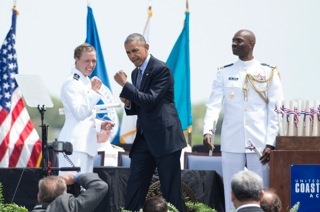The U.S. Coast Guard is on the front line of dealing with the impacts from climate change, and the refusal of politicians to accept and act on climate science amounts to “dereliction of duty,” President Barack Obama told the 2015 graduating class of the Coast Guard Academy.
“But the best scientists in the world know that climate change is happening. Our analysts in the intelligence community know climate change is happening. Our military leaders — generals and admirals, active duty and retired — know it’s happening,” Obama said at the ceremony for 218 graduates at New London, Conn., yesterday.
“And this is not just a problem for countries on the coasts, or for certain regions of the world. Climate change will impact every country on the planet. No nation is immune,” Obama said. “So I’m here today to say that climate change constitutes a serious threat to global security, an immediate risk to our national security.”
The Obama administration has cleared the way for new offshore oil and gas development off the Atlantic states and Alaska, drawing the ire of environmental groups. Yet Obama insists he aims to lower the rate of carbon emissions in the U.S. It’s a goal that gets little support from Republicans in Congress, who says it will stifle economic growth.
In his 42-minute keynote address, Obama spoke of the military as one part of U.S. society that gets it, studying the potential for climate change to worsen conflicts around the globe, and trying to reduce its own carbon emissions. He mentioned biofuels propelling Air Force fighters and Navy ships. Marines operating in Afghanistan are using solar power for austere forward bases, he said.
At home, the military is already affected by climate in places like Norfolk, Va., where shoreside facilities flood much more often than a few decades ago.
“So politicians who say they care about military readiness ought to care about this as well. Just as we’re helping American communities prepare to deal with the impacts of climate change, we have to help our bases and ports as well,” Obama said.
“And you are part of the first generation of officers to begin your service in a world where the effects of climate change are so clearly upon us,” Obama said. “It will shape how every one of our services plan, operate, train, equip, and protect their infrastructure, their capabilities, today and for the long term.”
Rising sea level and harsher weather conditions in some parts of the world will increase demands of the Coast Guard to mount humanitarian and relief missions, and deal with migrants seeking better lives, he said.
After a week when Congressional Republicans took his administration to task for low-balling the Coast Guard capital budget for new vessels, Obama turned it around, blaming Congress and its budget sequestration deals to reduce the deficit.
“We’re moving ahead with new Fast Response Cutters, new Offshore Patrol Cutters. We’re on track to have a full fleet of new National Security Cutters — the most advanced in history. And I’ve made it clear that I will not accept a budget that continues these draconian budget cuts called sequestration, because our nation and our military and our Coast Guard deserve better,” Obama said to applause.
Coast Guard officials say they need more than $2 billion a year to meet goals for replacing older ships, but in the last five years they have gotten no more than $1.5 billion, according to a recent Government Accounting Office report.
With less summer ice and growing maritime activity in the Arctic, the service needs a decision too on building at least one new heavy icebreaker.
“The United States is an Arctic nation, and we have a great interest in making sure that the region is peaceful, that its indigenous people and environment are protected, and that its resources are managed responsibly in partnership with other nations,” Obama said. “And as the Arctic opens, the role that the Coast Guard plays will only grow. I believe that our interests in the Arctic demand that we continue to invest in an enduring Coast Guard icebreaking capacity.”




